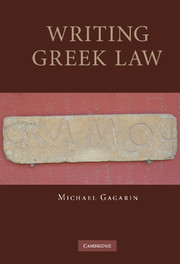Book contents
- Frontmatter
- Contents
- List of illustrations
- Preface and Acknowledgments
- List of abbreviations
- Introduction: Writing Greek Law
- Chapter 1 Law before Writing
- Chapter 2 Writing and Written Laws
- Chapter 3 Why the Greeks Wrote Laws
- Chapter 4 Why Draco Wrote his Homicide Law
- Chapter 5 Oral and Written in Archaic Greek Law
- Chapter 6 Writing Laws in Fifth-Century Gortyn
- Chapter 7 Writing the Gortyn Code
- Chapter 8 Writing Law in Classical Athens
- Chapter 9 Writing Athenian Law: a Comparative Perspective
- Chapter 10 Writing Law in Hellenistic Greece
- Conclusion: Writing Greek Law
- Appendices
- Bibliography
- Index Locorum
- Subject Index
Introduction: Writing Greek Law
Published online by Cambridge University Press: 22 September 2009
- Frontmatter
- Contents
- List of illustrations
- Preface and Acknowledgments
- List of abbreviations
- Introduction: Writing Greek Law
- Chapter 1 Law before Writing
- Chapter 2 Writing and Written Laws
- Chapter 3 Why the Greeks Wrote Laws
- Chapter 4 Why Draco Wrote his Homicide Law
- Chapter 5 Oral and Written in Archaic Greek Law
- Chapter 6 Writing Laws in Fifth-Century Gortyn
- Chapter 7 Writing the Gortyn Code
- Chapter 8 Writing Law in Classical Athens
- Chapter 9 Writing Athenian Law: a Comparative Perspective
- Chapter 10 Writing Law in Hellenistic Greece
- Conclusion: Writing Greek Law
- Appendices
- Bibliography
- Index Locorum
- Subject Index
Summary
This book examines the history and significance of writing in Greek law. I start from the assumption that although writing in general, and writing law in particular, share certain common features in almost any culture, there are also culturally specific aspects to writing and writing law. I shall argue, in fact, that writing, and specifically writing law, played a significantly different role in Greek law than in other comparable “premodern” societies. Moreover, both by its presence and just as importantly by its absence, writing was a key factor in shaping the special, even unique, nature of Greek law. Thus, a study of the history of writing and Greek law from the beginning through the classical period and (briefly) into the Hellenistic Age will help us understand what Greek law is, how it developed in the special way that it did, and why it became so different from the legal systems with which most legal historians are familiar. The results of this study have important implications for resolving the long debated question of “the unity of Greek law” – that is, in what sense, if any, it is useful to speak about “Greek law” as a coherent institution – and for understanding the special nature of Greek law.
- Type
- Chapter
- Information
- Writing Greek Law , pp. 1 - 12Publisher: Cambridge University PressPrint publication year: 2008

